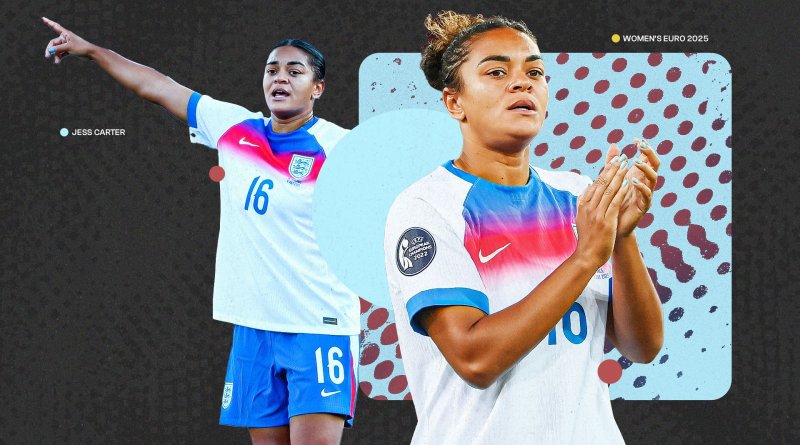Jess Carter Reborn: England’s Left-Back Fix at Euro 2025
Jess Carter delivered the type of turnaround that defines tournaments. Written off by many after Delphine Cascarino tormented her in England’s 2-1 defeat to France, the Gotham FC defender responded three nights later with a composed, assertive display in the 3-0 win over the Netherlands. Her revival owed much to Sarina Wiegman’s tactical tweak—but it was also a reminder of the versatility and resilience that persuaded the Lionesses boss to trust her in the first place.
Why Jess Carter Thrives in a Back Three
Wiegman abandoned the orthodox back four that exposed Carter in the opener and instead rolled out a 3-4-1-2. That subtle shift pushed the 26-year-old into the left channel of a back three—her comfort zone at both club and international level. With the wing-back now tracking runners out wide, Carter could concentrate on what she does best: positioning, intercepting passes and carrying the ball into midfield. The result? Nine ball recoveries, four successful duels and zero dribbles allowed down her flank.
The Left-Back Conundrum England Needed to Solve
England’s only problem position since Wiegman’s appointment has been left-back. Rachel Daly briefly filled the void at Euro 2022, Alex Greenwood stepped in at the 2023 World Cup and Niamh Charles started most qualifiers. None are natural full-backs, and each solution affected balance elsewhere. Jess Carter, a centre-back by trade, hardly seems an obvious answer, yet her two-footedness and defensive IQ give England a stable platform when the system suits her traits.
Numbers That Back Up Carter’s Case
• 86% pass completion versus the Dutch, up from 71% against France
• 3 progressive carries, the most of any England defender on the night
• 0 fouls conceded, a testament to improved timing in challenges
Opta’s data shows Carter ranking in the top five for interceptions per 90 among players in Switzerland, underlining her knack for reading danger early.
Tactical Mastery: Wiegman’s Mid-Tournament Gamble
Sarina Wiegman rarely alters her XI mid-tournament, but she recognised that France exposed a structural flaw rather than an individual failing. By matching the Dutch 3-4-1-2, she ensured England’s back line always had cover. Carter tracked Lineth Beerensteyn centrally, Lucy Bronze shut down the right, and Millie Bright swept behind. Meanwhile, Keira Walsh dropped to form a temporary back four when possession was lost, further insulating Carter from 1v1 sprints into space.
Impact on the Midfield and Attack
With the defence settled, Georgia Stanway and Ella Toone pressed higher, Lauren Hemp hugged the touchline and Beth Mead dovetailed with Alessia Russo. Carter’s progressive passing found Hemp early, pinning the Dutch wing-back deeper and preventing overlap. England’s first goal came directly from Carter receiving under pressure, turning sharply inside and releasing Hemp, whose cross was tapped home by Russo.
What Jess Carter Brings Beyond the Numbers
Leadership: Despite only 26 caps, teammates describe Carter as “calmly vocal,” constantly adjusting the line.
Versatility: Comfortable at centre-back, full-back or wing-back, she allows Wiegman to switch formations without substitutions.
Mentality: The rapid rebound from a tough opening night showcased thick skin—vital in knockout scenarios.
These intangibles help explain why Emma Hayes valued her at Chelsea and why Gotham moved quickly to secure her NWSL switch.
The Road Ahead: Wales, Then the Knockouts
England enter their final group game against Wales knowing a draw guarantees progression. Expect Wiegman to stick with the back three, meaning Jess Carter keeps her place. Wales will target set pieces through Kayleigh Green, so Carter’s aerial reach (1.72m) becomes crucial. If the Lionesses advance, they could face Spain or Italy in the quarter-finals, both sides that overload wide areas. Carter’s ability to tuck in as a third centre-back while still covering the flank will again be indispensable.
Competition for the Shirt
Niamh Charles remains an option if Wiegman reverts to a 4-3-3, and Alex Greenwood offers left-footed balance. Yet Carter’s display against top-ranked opposition has nudged her ahead. Form, fitness and tactical fit will dictate selections, but she has made the strongest case so far.
Ticket, TV and Fixture Essentials
Fans eager to witness Carter’s renaissance can still find limited tickets on UEFA’s resale portal, while BBC and ITV share broadcast duties in the UK. The Women’s Euro 2025 final takes place 27 July at Basel’s St. Jakob-Park—exactly the stage Carter has in mind after lifting silverware at Euro 2022 and reaching the World Cup final in 2023.
Opinion: Carter Deserves the Lasting Trust
Jess Carter’s journey from scapegoat to solution mirrors England’s broader evolution—resilient, adaptive, unafraid to make bold calls. Critics who saw only her struggles against France missed the larger picture: in a squad short on natural left-backs, her hybrid skill set may be the best long-term answer. If Wiegman keeps maximising those strengths, Carter will not just plug a gap—she could redefine the role for the Lionesses.
Your global gateway to nonstop football coverage:
News Goal
Share this content:

